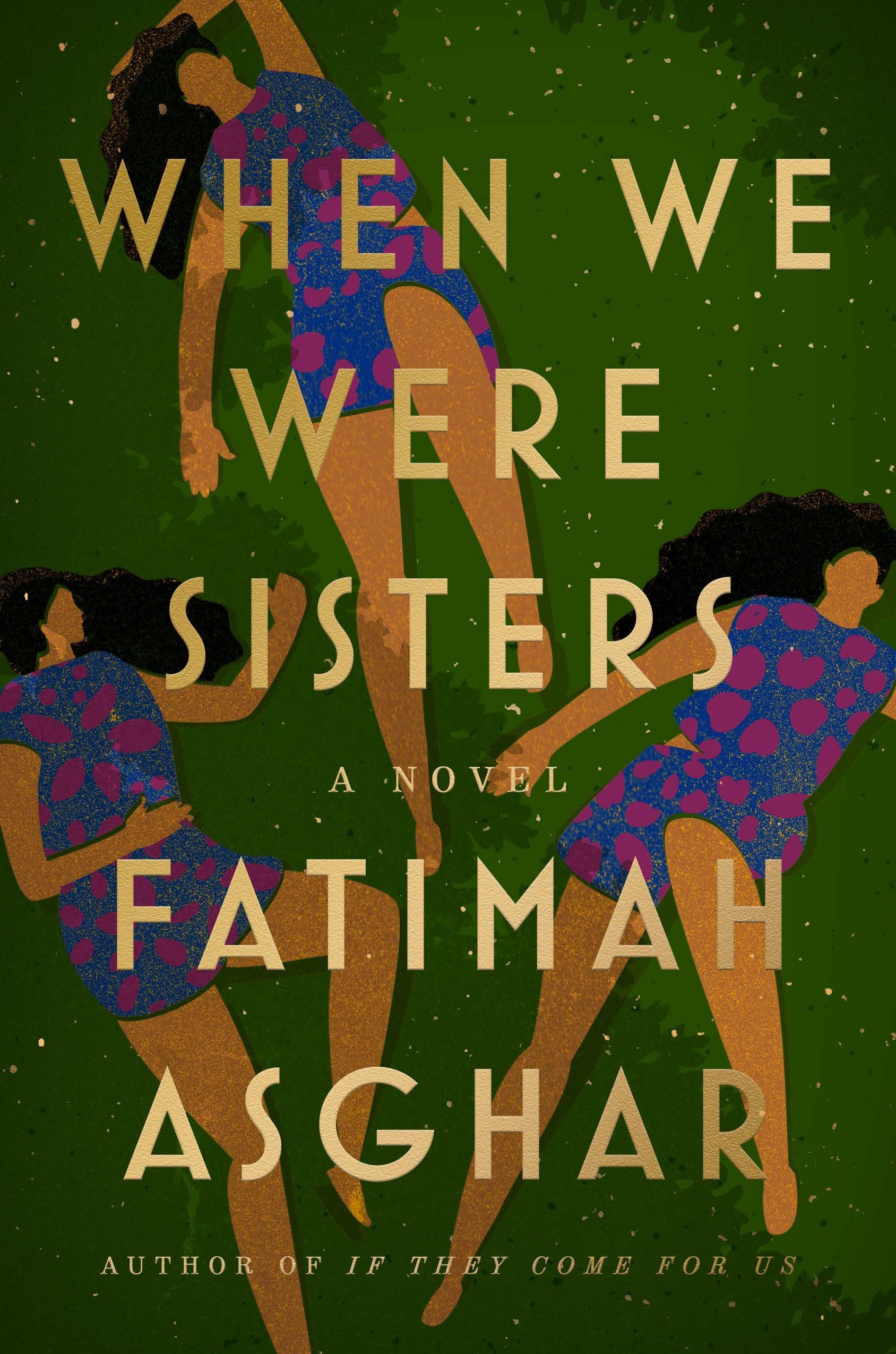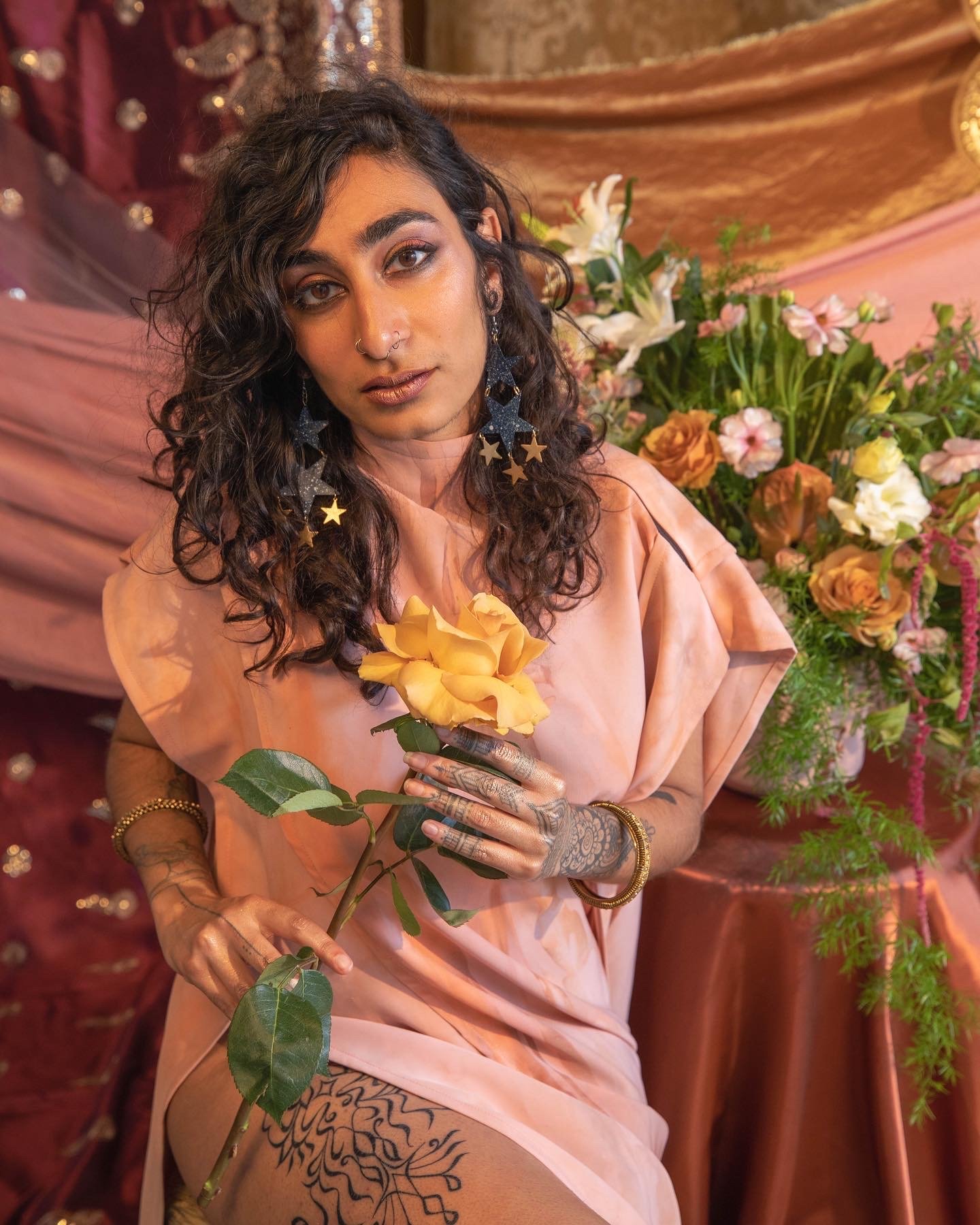Sisterhood Beyond Gender, Novel Beyond Genre: When We Were Sisters by Fatimah Asghar
Words by Serena Zets
Photo by Mercedes Zapata
There is something irreplicable about prose written by poets. Their prose plays with form, warps timelines, bends genres, and contains a powerful lyricism and playfulness regardless of subject matter. It leaves the reader asking not only, “What did I just read?” But, “Where can I find more of it?” When We Were Sisters, the debut novel by poet and artist Fatimah Asghar is a feat of such transformative poetic writing. In our interview for this piece, Asghar described a novel as “an undoing. It’s vibrant, it’s rich, it’s robust.” When We Were Sisters is exactly that and more; it's an undoing of what we thought a novel was and who a sister can be.
Asghar is an unparalleled poet, performer, screenwriter, and thinker who has gifted us all with this fiction debut. I was fortunate enough to interview them for this piece and learn more about the process behind this important and transcendental book that explores diasporic family dynamics and sisterhood beyond genre. Just like when I finished reading the novel, the conclusion of my interview with Asghar left me with a lingering sense of sisterhood and solidarity. Fatimah’s work and words make me feel so much less alone in the world. I felt sisterhood and solidarity like there was another writer, a community of writers even, who sought to complicate gender and sisterhood in new ways. Who work to write novels in new forms. Who wanted this radical work to reach and challenge audiences. In When We Were Sisters, Asghar achieved all of this and more.
Hooligan first profiled Fatimah in 2018, ahead of the publication of their poetry collection, If They Come For Us. The collection of poems explored Partition, sexuality, race, South Asian identity, religion, orphanhood, and coming of age. It deeply resonated with readers (myself included) and went on to be one of the Top Ten Books of the Year by the New York Public Library and was a finalist for the Lambda Literary award. Now, four years later, Fatimah has notably co-produced and written an acclaimed episode of Ms. Marvel on Disney+ and shared a corresponding Ms. Marvel Partition reading list. They also co-edited the poetry anthology Halal If You Hear Me with Safia Elhillo and have done so much more in artistic and poetic spaces.
When We Were Sisters dissects important themes of sisterhood, gender, grief, memory, religion, family, and queerness through the experiences and relationships of three sisters grappling with the death of their parents. It raises a lot of the same complications and tensions of queer South Asian identities explored in If They Come For Us, but this time through characters and an overarching narrative rather than poems. The novel introduces us to three sisters, Noreen, Aisha, and Kauser in the wake of their father’s murder in 1995. Noreen is the oldest and becomes responsible for the sisters. Aisha, the middle child, is expressive in her anger about their father’s death and undesirable situation. And Kausar, the youngest, and the book’s narrator is just trying to make sense of it all. Their Uncle [ ], whose name is purposefully redacted throughout the novel, offers to take them in but promises his opposing American wife and two sons “it’ll be like they never existed”. This initial portrait of the Uncle [ ] indicates his cruelty and negligence to come. While the sisters are given a place to live, they may as well be on their own as their relatives are largely uncaring towards them. “How terrible–to be an ordinary orphan. Not a superhero. Not a wizard in waiting. Not a prophet who goes to a cave. Just–ordinary. All that grief, wasted. All that fucking grief for nothing.” The sisters, “ordinary orphans”, make the most of their situation by turning to each other for support.
While the novel centers around Kausar, Aisha, and Noreen, their Uncle [ ] is an important character, as he is the primary adult and “caregiver” figure in their lives. We don’t know much about the sisters’ lives prior to their father’s murder, thus we learn a lot about each of them through their interactions and relationships with their Uncle [ ].
When discussing the choice to redact the Uncle’s name, Fatimah told me, “In fiction you don’t really see redactions. But in this case, it felt important to communicate the weight and the fear, ‘a scar’, on the narrator in terms of the Uncle.” Since the book came out, Fatimah noticed that amongst readers there “isn’t an ease when speaking about the Uncle and that is so fascinating to me. How do you talk about a character that is so complicated?”
Even as I’m writing this piece and discussing this work I’ve thought so much about, I still don’t know how to appropriately address the Uncle. I feel a tension within myself given the weight of his character on the sisters. He holds their fates in his hands and chooses to do what he wishes, not what is best for them. He leaves them without food, money, and other necessities while renting out the apartment’s additional bedrooms to immigrants, some of whom form familial relationships to the sisters. Without Uncle [ ] to turn to for help, the sisters turn to each other, forging a bond that gets repeatedly tested by the gravity of their situation and lives.
Another central tension within the book is the challenging of gender, gendered roles, and sisterhood itself. “This novel is a huge exploration of gender. It is about inherited gender and the gender you chart out for yourself. It’s about what do you do when none of the labels really fit.” Gender is mainly traversed through the youngest sibling Kauser’s rejection of the gender assigned to them as well as the sisters’ ever-changing relationship to each other. A line of Kauser’s that I love is, “My body is still pretending to be a girl, even though I’m not.”The book explores sisterhood beyond womanhood and gender through the sisters' interactions with each other. The book’s sisterhood is so complicated because it exemplifies a definition of sisterhood we haven’t fully seen. The label sister doesn’t fully capture or describe the sisters’ relationship when they are orphans living without parental figures. Kauser, Aisha, and Noreen show us that sometimes our bodies and language betray us.
“This novel is a huge exploration of gender. It is about inherited gender and the gender you chart out for yourself. It’s about what do you do when none of the labels really fit.”
- Fatimah Asghar
“It’s a huge meditation on language. It’s really explicit about the way that language doesn’t quite fit some of these definitions. Language doesn’t always give us what we need it to.” Their way of taking care of each other in the absence of parents disposes of our traditional definitions of gender and siblinghood. The three sisters work together to form an almost genderless way of caring for each other; in a life marked by absence, they make their care for each other abundant. The book concludes with the sisters returning home for a major life event, another moment of grieving. As they envelop each other in care and love, Asghar meditates on sisterhood one last time by writing, “Sisters. The word sounds foreign. Not what we are. Not what we ever were. A small word. Trying to hold us together.”
The emotional component of the book and questioning of gender feels like evidence of the powerful execution of genre-bending being done through the book. Fatimah shared with me, “My background as a poet influences everything I do. It’s a real love for language, for how things sound out loud, how the page looks spatially.” This love for language and toying with its use comes through on each page of the book. When approaching this book, Asghar thought intentionally about the visual components of it and wanted to work with the book’s designer to ensure it was just right. The final product feels more like an interactive visual art piece than a traditional novel. As you read, you don’t know which pages will force you to turn the book in order to read its text or will contain a visual art element changing the narrative itself. The book’s narrative is heavy, yet the form itself is playful.
Asghar said that some of the feedback she got on drafts of the novel was that it was too lyrical but they held firm in their belief that this book had to be told lyrically. She said “It’s not just a stylistic thing but an ethical choice to write a lyric novel. A lyric novel subverts a linear timeline and narrative. When the story comes, you want to capture it however you can. And this story was lyrical.” As a reader and writer, it is hopeful to see a lyrical book like When We Were Sisters strike a chord with audiences and achieve publishing success. Asgharmentioned the books We The Animals and Another Bullshit Night in Suck City as lyric prose that she drew inspiration from in writing this book. Readers should continue seeking stories that subvert genre and form and that allow complex characters to live complicated lives and share them in their own voices.
Just as reading When We Were Sisters is an emotional journey for the reader, so was writing it. Its narrative was so heavy and winding that it couldn’t be written in isolation. Asghar and I talked at length about the myth of the solitary writer who does everything in a vacuum removed from their life, relationships, and the world. Asghar’s writing process stands in direct opposition to the myth of the solitary writer; it’s an incredibly collaborative and communal effort. A novel, like any piece of art, takes a community of support and love to be published. Asgharkept reiterating to me that this book wouldn’t have been made possible without their communities; artistic, geographic, diasporic, and more. Throughout the process of writing the book, Asghar said they felt a kind of love from their friends and fellow artists that is “so specific and it’s something only artists can do for each other.” This love is a real-world application of the radical sisterhood explored in the book. This book was published as a result of it, reminding us that transformative art comes out of sisterhood and us caring for each other.
“Love comes from showing up. To be loved through mistakes is transformative. It changes your life.”
This statement is true of both the characters of When We Were Sisters and the communities behind Fatimah’s writing of this story. When We Were Sisters is the kind of book that changes your life; our world is made better by this piece of art being in it. It challenges our conceptualizations of who a sister is, what sisterhood can be, and what a novel is capable of. As a queer South Asian sister, writer, and reader, this book challenged my understanding of myself, my writing, and my place in the world. Regardless of what identities you hold, through reading When We Were Sisters, we are reminded of our boundless capacities for care and creation. . May we be better sisters to each other, regardless of our gender, and create powerful communal art in the process.



